The BJCP (Beer Judge Certification Program) is an American organization founded in 1985. The main goal of the association is to promote the appreciation of beer, cider, and mead. In this guide, I’ll cover the beer side of the program.
I am a Master BJCP judge based in Rome (Italy) who joined the program in 2017. I also serve as a Lead Grader (which means I grade BJCP exams) and as an Exam Administrator here in Italy.
The BJCP primarily focuses on developing and providing standardized tools for the structured evaluation of beer. The evaluation is based on style parameters codified by the BJCP guidelines, which are published and updated periodically. In BJCP competitions around the world, as well as in other contests, BJCP Scoresheets are used to evaluate beer.
BJCP competitions are open to all judges, not only those certified by the BJCP. They can be competitions for homebrewed beers as well as contests aimed at professional brewers. Being a BJCP judge does not guarantee being invited to judge at BJCP competitions, but it can be considered an added value, especially at the higher certification levels, which attest to greater knowledge and experience.
BJCP judge ranks (listed in order of achievement):
- Provisional
- Recognized
- Certified
- National
- Master ← I am here
- Grand Master
There is also another rank: Apprentice. This is a temporary rank. It is assigned to those who attempt the Tasting Exam but fail. The candidate has two years to retake the exam; otherwise, they lose the Apprentice rank and become Affiliated.
Affiliated is a status, not a rank. It means that the person is no longer considered a BJCP member but retains their ID in case they later pass an Entrance Exam and then the Tasting Exam.
BJCP exams (listed in order of feasibility):
- BJCP Judge Entrance Exam (online exam)
- BJCP Judging exam (tasting exam) ← My best score: 91/100
- BJCP Written Proficiency Exam (written exam) ← My score: 93/100
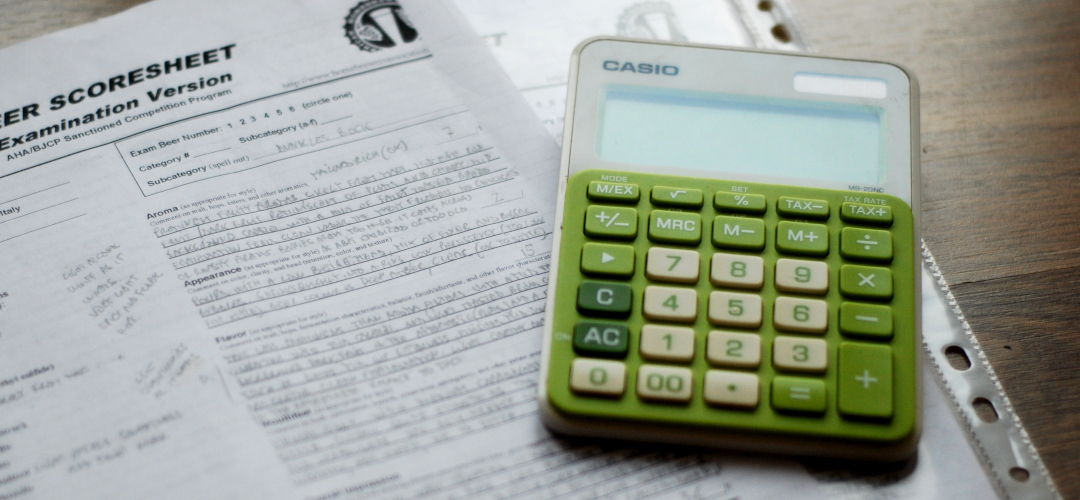
BJCP exams
To join the BJCP and advance within its ranking system, candidates must pass a series of exams. The first is an Online Exam, which is fairly easy. It is a pass/fail exam, with no score given.
The second is a Tasting Exam, held in-person. This exam is fairly easy to pass, but achieving a high score is not easy. A minimum score of 60/100 is required to pass.
The third is a Written Exam, also taken in-person. Aside from a very brief initial section with T/F questions, the rest consists of short essays that require significant effort. The passing score is 60/100. This is the final BJCP exam and is quite challenging.
BJCP Beer Judge Entrance Exam (Online Exam)
The BJCP Beer Judge Entrance Exam is an online exam that consists of 180 multiple-choice questions to be answered in 60 minutes. Non-native English speakers may request an extension to 90 minutes.
The exam is not particularly difficult. With some general knowledge about beer and beer styles, is feasible.
There is no verification system to ensure that the person taking the exam is actually the registered candidate, nor are there checks on the browser windows that may be consulted during the exam.
This is not an encouragement to cheat, of course, but with 90 minutes available for non-native speakers, there is enough time to look up the more difficult answers online. And I imagine there may be people around the world who take the online exam on behalf of others. Other exams, such as the Cicerone, have stricter identity checks and enforce measures to prevent candidates from looking up answers online during the exam.
Let’s say this exam exists mainly to prevent just anyone from moving on to the next step, which is the BJCP Judging Exam.
Here you can find all the details on the topics covered in the online exam. Here you can register for the exam for $10. There is also the option to try a free test with 20 questions.
Once the online exam is passed, the candidate receives the title of Provisional Judge. At this stage, one does not yet receive a BJCP ID number nor access to the members’ area of the BJCP website, but experience points earned by participating in BJCP competitions as a Provisional judge are recorded using the email address as an ID.
The experience points will become visible on the BJCP website once the Tasting Exam has been taken and a BJCP ID number has been assigned.
Once the online exam has been passed, there are two years available to attempt the Tasting Exam. Otherwise, the online exam must be taken again.
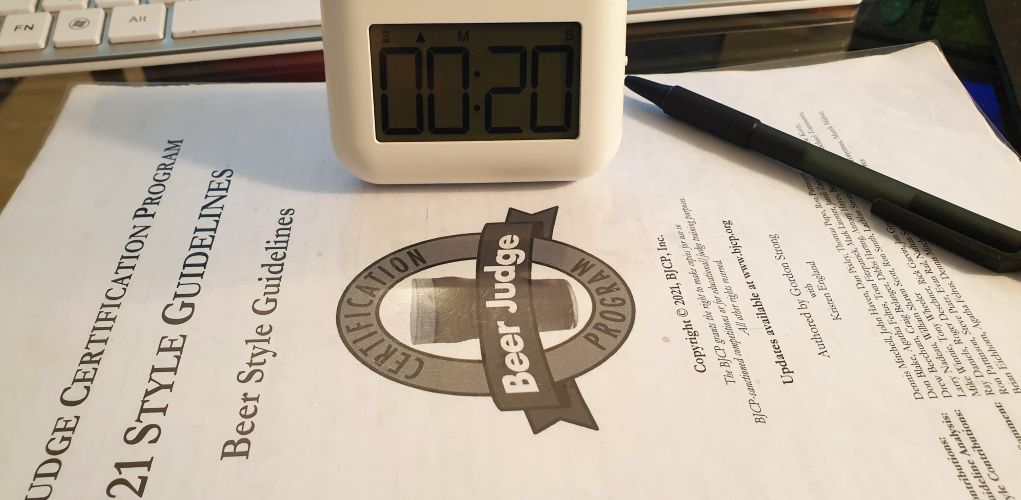
BJCP Judging Exam (in-person Tasting Exam)
The BJCP judging exam consists of a blind tasting and evaluation of six beers using the BJCP Scoresheets. The exam lasts one and a half hours and takes place in-person. Multiple exam sessions are organized worldwide by BJCP judges. The schedule is available here. Seats are generally limited to 12. Outside the U.S., exams are not that frequent, so it’s best to register well in advance. The cost of the exam is 40$.
The evaluation of the exam beers is made against the BJCP Style guidelines. It is a closed book exam.
Scoresheets are usually filled out in English. In some cases, administrators allow candidates to take the exam in another language. The scoresheets are typically translated into English and graded, since only in a few cases is there a grading chain (which requires several judges of different levels) in languages other than English.
Exams are graded based on the scoresheets filled in by two or three proctors. Proctors are experienced judges who fill out the scoresheets blindly, in exactly the same way as the candidates. Grading usually takes three to six months, with translation adding a few extra months.
Passing the exam is fairly straightforward. I know only one person who hasn’t passed it (in this case, they got assigned the Apprentice rank). As a grader, I’ve evaluated several candidates with very low-level skills, but because of how the scoring system is structured, it’s really difficult to assign a failing score.
In my opinion, this is an aspect that could be improved. There are, in fact, too many BJCP judges around the world who stop at the basic level (Recognized), settling for a very low score. This can sometimes undermine the value of the BJCP certification, especially in the eyes of those who have no idea about the ranks and how progression between them works.
Let’s say that 70 is considered a fair score. A good starting point to get some solid experience. An 80 is good and usually indicates solid knowledge about beer and well-prepared scoresheets. Of course, BJCP ranks and scores are not the only way to assess a judge’s quality and experience, but they provide a useful benchmark.
Here are some links to previous posts where I share more about the Tasting Exam:
- My first ever BJCP Tasting Exam (italian)
- BJCP: study tools (post in italian, resources in English)
- Master Level BJCP Tasting Exam Scoresheets (Francesco Antonelli)
- A grader’s view on the most frequent mistakes in BJCP exam scoresheets
The highest rank achievable with the written exam is Certified. To go beyond this, it is necessary to take the Written Exam.
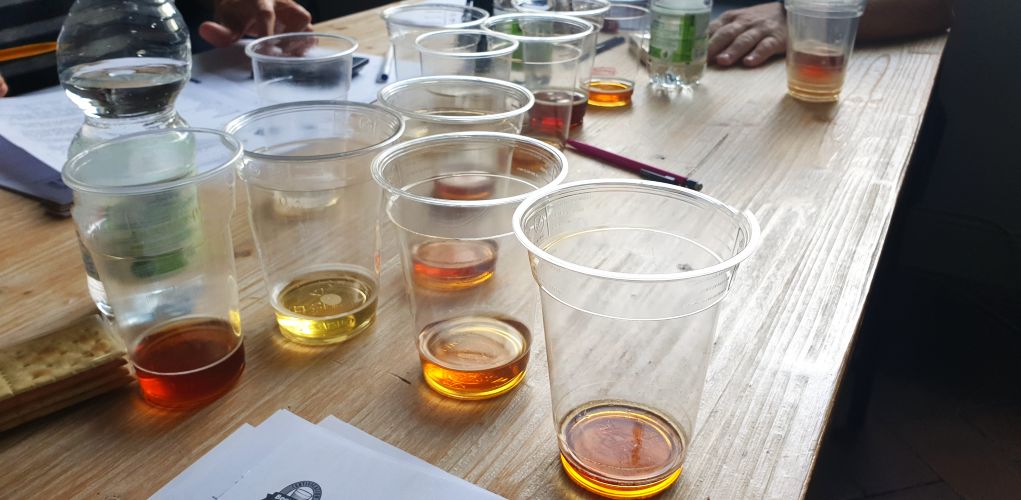
BJCP Written Proficiency Exam (in-person Written Exam)
This is the most advanced exam in the BJCP pathway. No beers are tasted; this exam is entirely based on theoretical knowledge. It lasts an hour and a half and covers styles, recipes, faults, ingredients, and the brewing process.
The cost of the exam is 25$.
Some detailed posts about the Written Exam that I wrote in the past:
- My thoughts about the Written Exam
- My Written Exam
- BJCP Written Exam / General Advice and T-F Questions
- BJCP Written Exam / How to answer the Styles Question
- BJCP Written Exam / How to answer the Recipe Question
The Written Exam can only be taken if a candidate has scored 80 or higher on the Tasting Exam and has earned at least 10 experience points from judging. If the average score between the Tasting and Written Exams is 80 or higher, and the candidate has accumulated 20 experience points (at least 10 from judging), a National rank is awarded.
What judges at the National level and above can do:
- Serve as proctors for exams (in some cases with travel reimbursement)
- Organize exams (more on that here)
- Volunteer as graders and score exams (more on that here)
To reach the Master level, the average score between the Tasting and Written Exams must be 90 or higher.
The Written Exam is challenging. It requires extensive theoretical knowledge and a good amount of memorization regarding beer styles. Scoring an 80 on this exam is not easy; achieving a 90 is very difficult. Written Exams are not frequently scheduled, and often candidates need to travel to take one (especially in Europe, where they are held regularly only in Spain).
However, it is possible to ask a National or Master-level judge to organize one. Unlike the Tasting Exam, the Written Exam organization is quite straightforward. If there are no travel costs and the proposed date aligns with the quarters when Written Exams are held worldwide, the exam will likely be approved.
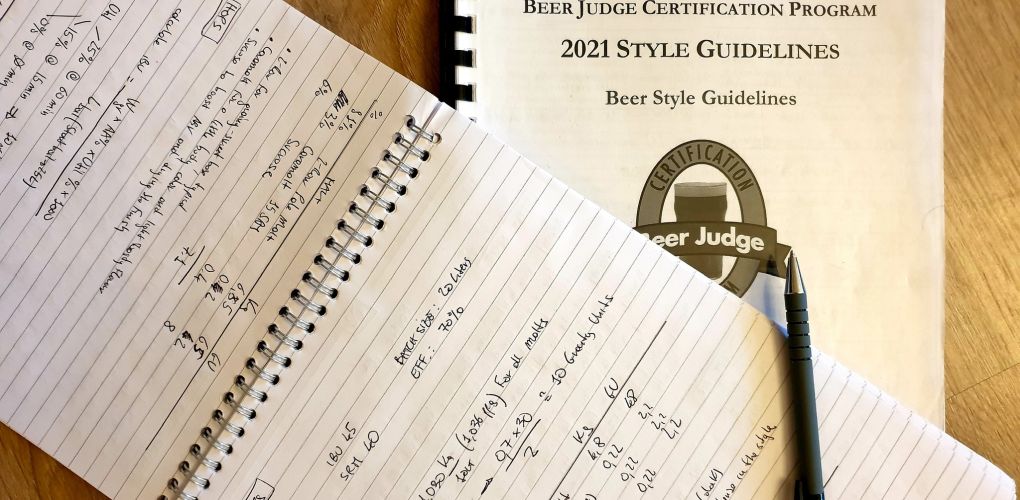
How the BJCP ranking works
The BJCP is based on a ranking system composed of six levels.
The Apprentice level is assigned to those who do not pass the Tasting Exam (score <60/100). Of course, the exam can be retaken. The Provisional level is assigned once the online exam is passed. The other four levels that can be reached through exams are Recognized, Certified, National, and Master. Advancement between these 4 ranks is based on exam scores and experience points.
Part of the experience points (Judging Points) are earned by serving as a judge in BJCP-sanctioned competitions. Judges can earn on average between 1 and 2 points per panel.
Additional points (non-judging points) can be earned by organizing or grading exams, serving as stewards in competitions, or taking on active roles within the BJCP organization (the latter is less common).
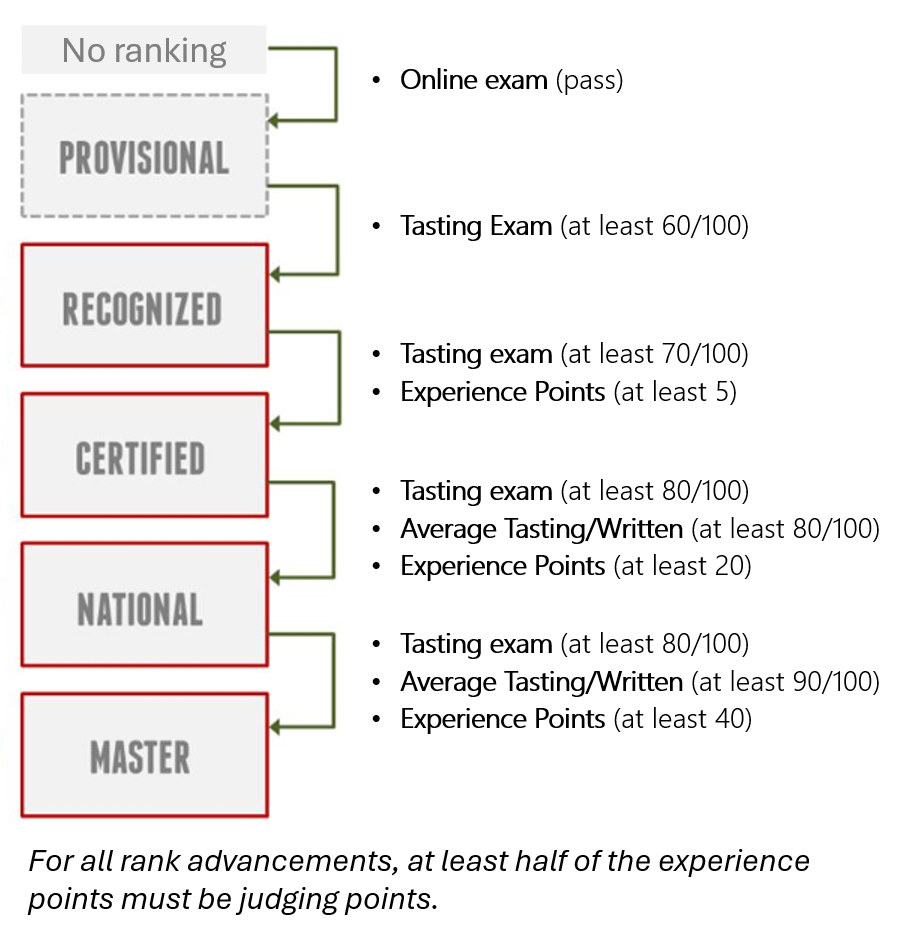
The final level is Grand Master. To advance from Master to Grand Master, no additional exams are required. Candidates need 100 experience points (at least 50 of which must be Judging Points) and 240 GMSR (Grand Master Service Requirements).
GMSR are earned through active participation in BJCP activities. For example, organizing an exam grants 10 GMSR. A grader who grades an exam with 12 participants earns 12 GMSR. A Lead Grader (a more experienced grader) earns double. There are other ways to earn GMSR points (details here).
To become Grand Master II, an additional 100 experience + 240 GMSR are required. And so on for Grand Master III, IV, V, …
Starting at the end of 2024, the Distinguished Certified e Distinguished National ranks were introduced to recognize the experience and dedication of BJCP judges who have not advanced through exams but have been active members of the BJCP for at least 15 years, with 40+ or 60+ experience points, respectively (here for details).
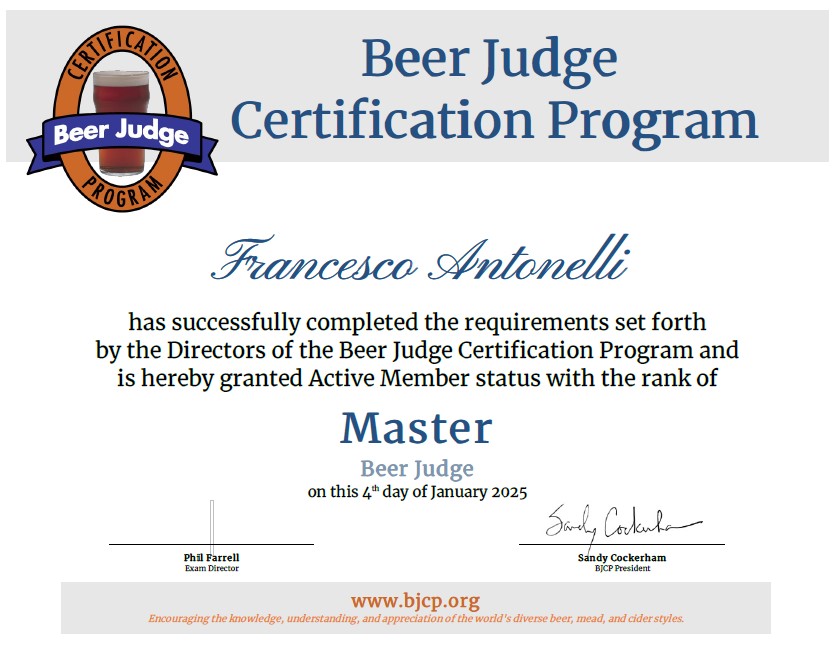
Where can I check the BJCP judges’ rankings?
There is an online database where you can verify whether a judge is actually an active member of the BJCP, but you should know the BJCP ID or the Name+Surname.
Online, there is a list of judges that are considered pre-authorized to participate in exams as proctors (link). From this list, you can see the judges’ ranks, but only for those at the National level and above.

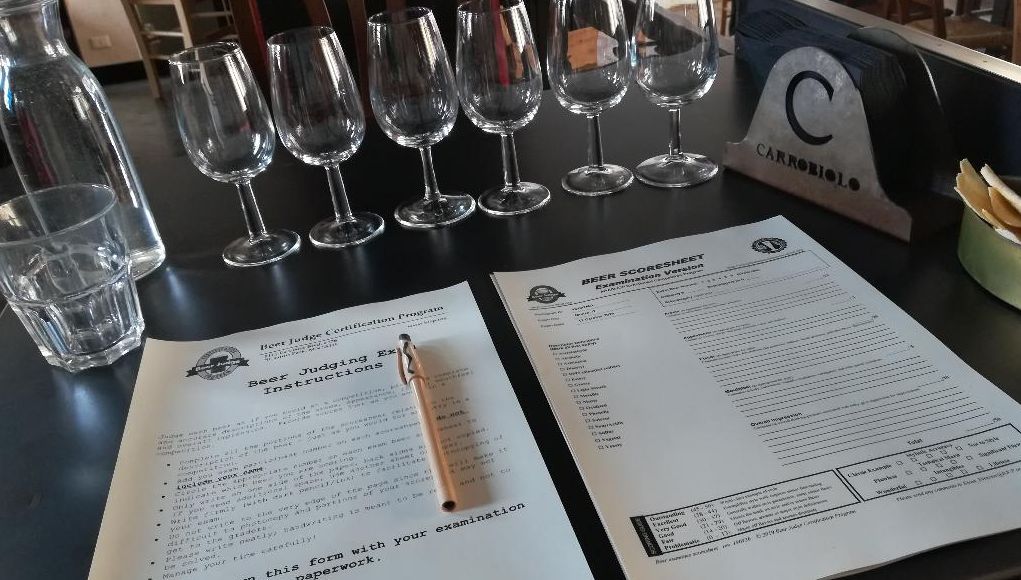
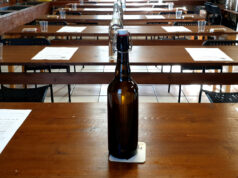
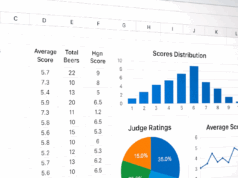
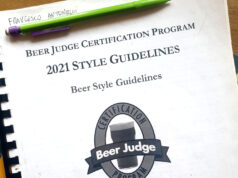
Hi Frank,
Great write-up! It’s super useful for people interested in the program and for new judges.
Regarding your last point, there is a tool to search for judges, but you need to know how the name was entered. You can also search by BJCP ID.
https://app.bjcp.org/judge-lookup
Thanks Johann! I’ll add the link in the post.